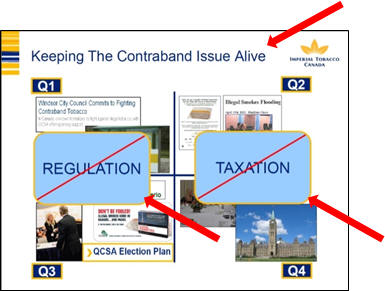|
Press Release
Quebec Coalition for Tobacco Control October 18, 2016 A leaked document from Imperial Tobacco shows how the Canadian Convenience Stores Association and its affiliate were used as front groups to block health regulations and tobacco taxes. A confidential presentation by Imperial Tobacco Canada to its multinational parent company, British American Tobacco, reveals both the objectives and tactics behind the company’s decade-long campaign to “keep the contraband issue alive”, despite the fact that contraband decreased substantially in the country during this period. The document, provided by an anonymous whistleblower,
shows how Imperial Tobacco used retailer and other
business associations as front groups for their lobbying
efforts aimed at preventing effective regulations and
tax increases. The document explains how these groups succeeded in providing a “credible voice for contraband tobacco”, a key strategic goal for the industry given its own lack of credibility. For example, the NCACT, which was set up by the CCSA and is managed by the lobbying firm Impact Public Affairs, is seen playing a key role in distancing Imperial Tobacco even further from its anti-regulation and anti-tax public relations campaigns (“Not just ‘Big Tobacco’!”). The document also shows how the industry was able to recruit credible third parties (like municipalities), purportedly to combat contraband, in order to use as political leverage to influence government policies and prevent the implementation of effective tobacco control measures. “The use of front groups by the tobacco industry is not new,” says Cynthia Callard, Executive Director of Physicians for a Smoke-free Canada, “but front groups are usually difficult to expose at the moment that they are the most effective. These revelations are particularly relevant today as these groups are currently involved in a campaign to undermine plain and standardized packaging reforms.” “The presentation highlights not only the extent to which the industry controls both the agenda and the messaging of pro-tobacco front groups, but also the tobacco industry’s ability to manipulate credible third parties who have no vested interests in the tobacco business, such as municipalities and the media, into helping them create a public and political narrative tailored to protect its interests.” “It is perfectly acceptable for retailers and other groups to express their views about government health initiatives,” adds Flory Doucas, spokesperson for the Quebec Coalition for Tobacco Control. “What is not acceptable is when the tobacco industry is allowed to hide behind front groups without disclosing their financial relationships with them.” Ms. Doucas noted that representatives from both groups repeatedly refused to answer questions about their financing during provincial and federal legislative hearings. “What is now clear is how easy it is for the industry to hide their involvement in a succession of campaigns aimed at subverting science-based public health measures that have broad public support. Front groups are a violation of one of the most basic principles of a functioning democracy: transparency. Governments have a duty not only to promote transparency but to ensure transparency in policy-making. Similarly, the media must be much more vigilant in exposing the true nature and purpose of groups that attempt to prevent governments from enacting public health measures, otherwise they too end up playing into the tobacco industry’s playbook,” concludes Ms. Doucas. Melodie Tilson, Policy Director with the Non-Smokers’ Rights Association, agrees: “Governments have a responsibility to protect public health from tobacco industry interference. This is not only a moral responsibility, but one required under international law”. Indeed, the global health treaty on tobacco (the WHO’s Framework Convention on Tobacco Control, ratified by Canada) puts the full onus on governments to monitor tobacco industry attempts to subvert tobacco control initiatives, to inform the public of these attempts and to adopt measures to prevent industry interference. “Imperial Tobacco’s presentation, together with the industry’s current attempts to prevent the implementation of federal regulations on plain packaging, clearly illustrate the vulnerability of the public interest to the industry’s deceptive practices and underscore the urgent need for measures aimed at making tobacco industry lobbying more transparent. After a decade of inaction, the federal government recently announced that it would be reviewing ways to strengthen implementation of this aspect of the treaty[1]. The question is: how long do we have to wait before the government puts a stop to these practices?” declared Ms. Tilson. The groups are asking:
- 30 - [1]
"Health
Canada recognizes the importance of Article 5.3 and in
the last quarter of 2015 put in place measures to
undertake a review of existing domestic actions, global
approaches and opportunities to reinforce and build on
current domestic measures. Details and outcomes of these
activities will be captured in Canada’s subsequent FCTC
reports." Government of Canada, “Framework Convention on
Tobacco Control: Canada's 2016 report”, 2016.
Relevant links:
1.
Imperial Tobacco Canada’s CORA presentation to British
American Tobacco
2.
Brief
analysis of the presentation (including counter-facts
and examples)
3.
BAT
description of CORA’s role (Corporate and Regulatory
Affairs)
4.
Directives related to
Article 5.3 of the Framework Convention for Tobacco
Control
on preventing tobacco industry interference
5.
Samples of CCSA’S current efforts to oppose plain
packaging:
public statements
regarding its impact on contraband, campaign to
mobilize retailers
through an
Internet module
including contraband arguments
6.
KPMG’s letter
regarding the tobacco industry’s unauthorized use of its
report linking Australia’s plain packaging legislation
to contraband (also see the
study’s disclaimer
on page 2)
7.
A
new British
Medical Journal study on tobacco industry
interference
which found that
“the
multifaceted opposition to standardised packaging
[in the UK] was
primarily undertaken by third parties with financial
relationships with major tobacco manufacturers” and
proposes recommendations similar to those listed above
8.
Recommendations by health groups
regarding a set of measures to limit tobacco industry
interference in tobacco control policy-making, in line
with the FCTC’s Article 5.3 guidelines
Contacts:
-
Cynthia Callard, Executive Director, Physicians for a
Smoke-Free Canada.
-
Melodie Tilson, Director of Policy, Non-Smokers’ Rights
Association.
-
Flory Doucas, Codirector and spokesperson, Quebec
Coalition for Tobacco Control.
|

-
